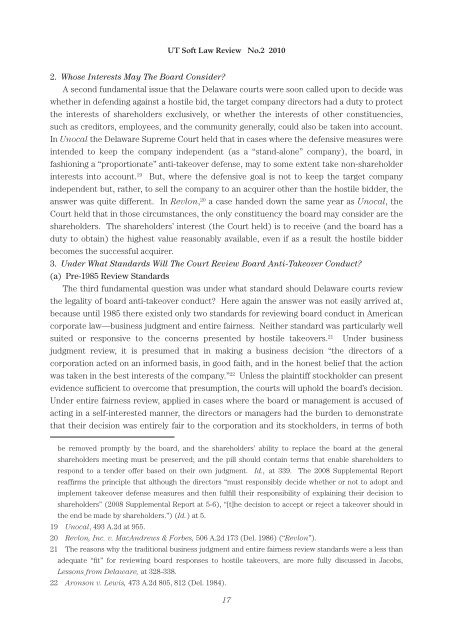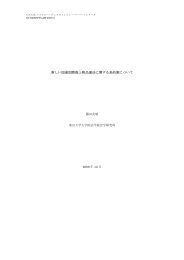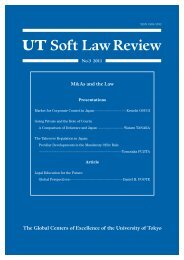UT Soft Law Review
UT Soft Law Review
UT Soft Law Review
Create successful ePaper yourself
Turn your PDF publications into a flip-book with our unique Google optimized e-Paper software.
<strong>UT</strong> <strong>Soft</strong> <strong>Law</strong> <strong>Review</strong> No.2 20102. Whose Interests May The Board Consider?A second fundamental issue that the Delaware courts were soon called upon to decide waswhether in defending against a hostile bid, the target company directors had a duty to protectthe interests of shareholders exclusively, or whether the interests of other constituencies,such as creditors, employees, and the community generally, could also be taken into account.In Unocal the Delaware Supreme Court held that in cases where the defensive measures wereintended to keep the company independent (as a “stand-alone” company), the board, infashioning a “proportionate” anti-takeover defense, may to some extent take non-shareholderinterests into account. 19 But, where the defensive goal is not to keep the target companyindependent but, rather, to sell the company to an acquirer other than the hostile bidder, theanswer was quite different. In Revlon, 20 a case handed down the same year as Unocal, theCourt held that in those circumstances, the only constituency the board may consider are theshareholders. The shareholders’ interest (the Court held) is to receive (and the board has aduty to obtain) the highest value reasonably available, even if as a result the hostile bidderbecomes the successful acquirer.3. Under What Standards Will The Court <strong>Review</strong> Board Anti-Takeover Conduct?(a) Pre-1985 <strong>Review</strong> StandardsThe third fundamental question was under what standard should Delaware courts reviewthe legality of board anti-takeover conduct? Here again the answer was not easily arrived at,because until 1985 there existed only two standards for reviewing board conduct in Americancorporate law—business judgment and entire fairness. Neither standard was particularly wellsuited or responsive to the concerns presented by hostile takeovers. 21 Under businessjudgment review, it is presumed that in making a business decision “the directors of acorporation acted on an informed basis, in good faith, and in the honest belief that the actionwas taken in the best interests of the company.” 22 Unless the plaintiff stockholder can presentevidence sufficient to overcome that presumption, the courts will uphold the board’s decision.Under entire fairness review, applied in cases where the board or management is accused ofacting in a self-interested manner, the directors or managers had the burden to demonstratethat their decision was entirely fair to the corporation and its stockholders, in terms of bothbe removed promptly by the board, and the shareholders’ ability to replace the board at the generalshareholders meeting must be preserved; and the pill should contain terms that enable shareholders torespond to a tender offer based on their own judgment. Id., at 339. The 2008 Supplemental Reportreaffirms the principle that although the directors “must responsibly decide whether or not to adopt andimplement takeover defense measures and then fulfill their responsibility of explaining their decision toshareholders” (2008 Supplemental Report at 5-6), “[t]he decision to accept or reject a takeover should inthe end be made by shareholders.”) (Id.) at 5.19 Unocal, 493 A.2d at 955.20 Revlon, Inc. v. MacAndrews & Forbes, 506 A.2d 173 (Del. 1986) (“Revlon”).21 The reasons why the traditional business judgment and entire fairness review standards were a less thanadequate “fit” for reviewing board responses to hostile takeovers, are more fully discussed in Jacobs,Lessons from Delaware, at 328-338.22 Aronson v. Lewis, 473 A.2d 805, 812 (Del. 1984).17





